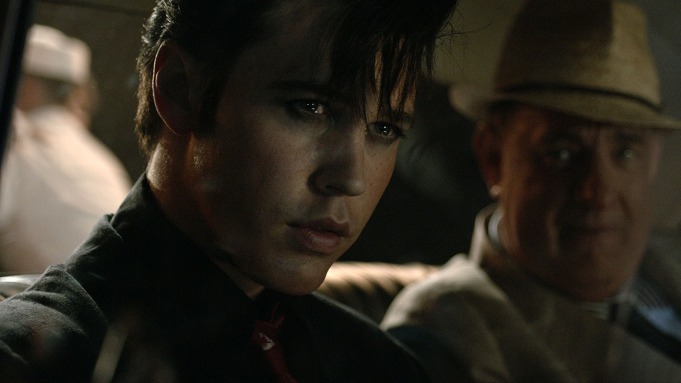That’s Showbiz, by Bob Connally
27 Jun
Generally when it comes to biopics about famous 20th century musicians, there seems to be a standard template. It was very odd many years ago to come out of Walk the Line (released a year after Ray) and feel like Johnny Cash and Ray Charles had led essentially the same life. There have been notable exceptions (Love & Mercy and Get On Up), but there is rarely much filmmaking imagination brought to these kinds of films. However, when Baz Luhrmann (Moulin Rouge) makes a movie about Elvis Presley, you know you’re going to be in for something different.
In terms of story structure, Elvis doesn’t shake things up much. While it’s somewhat surprising that it’s framed as being Colonel Tom Parker’s (Tom Hanks) story as much as Elvis’s (Austin Butler), it’s a pretty linear journey through the King of Rock’n’Roll’s life. What makes Elvis unique and very much a Baz Luhrmann film, is the style that drips from virtually every frame. Eschewing strictly period accurate music, Luhrmann infuses many of Presley’s songs with modern takes on them or styles of music that didn’t yet exist in Presley’s lifetime. Like A Knight’s Tale or Sofia Coppola’s Marie Antoinette, the idea is to demonstrate to a modern audience how those characters feel in the world around them at that moment, not to attempt to present things with historical accuracy.
With a screenplay credited to Luhrmann and three other writers, Elvis’s style is complemented and carried by the two performances at its center. Butler (Tex Watson in Once Upon a Time in Hollywood) delivers nothing short of a star-making performance as Presley. While he is playing one of the most documented individuals who’s ever lived, Butler makes us believe we’re seeing Elvis Presley on screen. The performance is so convincing that at no point did I ever catch myself thinking about if he was doing his own singing or not, something that most of us do when watching one of the many musician biopics that come along. We’re along for the ride with him and we’re immersed. As “the villain of this here story,” Hanks makes what could have easily been a very scenery chewing performance work tremendously. The trailers had me nervous about what he would be doing here but in the context of the film, his strange personality and unplaceable accent fit in perfectly with Luhrmann’s style.
The ups and downs of Presley and Parker’s professional and personal relationships are what Luhrmann is primarily interested in and it’s fascinating to see how much control the Colonel had over his star. Early in the film Presley tells friend B.B. King, almost off-handedly, that he lets the Colonel take care of the business side of things. All he’s really concerned with is being a showman. Given how badly Presley allows himself to be taken advantage of, partially because he doesn’t know any better and partially because he’s just not interested in business, Elvis becomes a cautionary tale as much as anything.
Even as someone with only a general knowledge of the life of Elvis Presley, I know there are many directions one could take with his story. He packed so much into his all too brief 42 year life. There were triumphs, incredible tragedies, and many truly bizarre and hilarious tales (he once took his private jet from Graceland to Denver and back late at night to get a particular sandwich, which could make a rollickingly fun film all by itself). Luhrmann’s largely straightforward narrative is effective in giving the style something to hang off of so as not too become a sensory overload. It also allows the performances to shine.
At 2 hours and 39 minutes, Elvis does feel as though it could have done with just a bit of trimming but it’s generally well paced and there’s really nothing that feels like it absolutely needed to be cut. This is also well worth experiencing on the big screen. Luhrmann gives concert scenes incredible energy and they bring us into the mindset of the fans who witnessed him change the world before their eyes. Whether you’re much of an Elvis Presley fan or not, this is a very good film about one of the more fascinating figures of the past century.




No comments yet